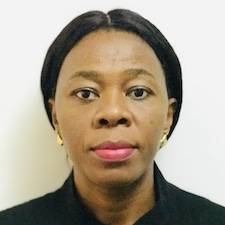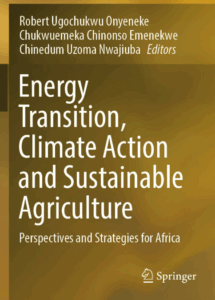Celebrating a Scholarly Achievement: Dr. Stella Ngozi Okoroafor’s Contribution to Springer Publication
We are proud to announce that Dr. Stella Ngozi Okoroafor, a recent doctoral graduate from Monarch Business School Switzerland, has co-authored a chapter titled “Fuel Subsidy Removal: Implications on the Nigerian Economy” in the Springer volume Energy Transition, Climate Action and Sustainable Agriculture: Perspectives and Strategies for Africa.
This chapter presents a rigorous systematic review, employing the PRISMA methodology, to evaluate the multifaceted impacts of fuel subsidy removal in Nigeria. Analyzing ten key academic studies published between 2012 and 2024, the authors provide a comprehensive synthesis of:
Economic Outcomes: Including inflationary trends, shifts in consumer behavior, and national income effects.
Social Consequences: Highlighting the disproportionate effects on vulnerable populations.
Policy Recommendations: Advocating for refinery revitalization, targeted subsidies, and investment in infrastructure.
The research contributes significantly to the discourse on energy transition in developing economies, offering valuable insights for policymakers and stakeholders. Her co-authored publication exemplifies the kind of high-impact, contextually relevant research our doctoral graduates contribute to global scholarship. Please join us in congratulating Dr. Okoroafor and her fellow authors on this outstanding academic achievement.
Article Abstract
Energy subsidies and indeed fossil-fuel subsidies is at the front burner discussions for most developing economies. Nigeria is not an exception, whereby the managers of the economy recently in 2023 announced the removal of premium motor spirit subsidy, leading into the era of removal of all forms of fuel subsidy in the country. This study investigates the implications of fuel subsidy reforms and the state of the Nigerian economy with complete removal of fossil-fuel subsidies. Given the nature of this topic of debate over the decades, this study adopts a systematic review (SR) of the scientific literature to assess the effect of fuel subsidy removal on the Nigerian economy. Using the standard Preferred Reporting Items for Systematic Reviews and Meta-Analyses (PRISMA) guidelines, a total of ten scientific papers within years 2012–2024 on the research topic were thoroughly reviewed. A mix of bibliometric and narrative analyses was used to synthesize, analyse, and interpret the findings of the review. The findings of the review reveal the consequences of eliminating fuel subsidies by examining the intricate and complex interaction between economic, political, environmental, and social factors.
The study showed negative effects of fuel subsidy removal on household and business sector in terms of their income, welfare and poverty indices, with the more vulnerable groups disproportionately affected. On the wider economy scale, the subsidy removal increased the inflation rate, reduced consumer demand and decreased output especially in the industrial sector, whereas it increases national income through government savings and revenue while reducing environmental costs in form of carbon emissions. The socio-political effects involve social unrest due to loss of means of livelihood and issues of addressing corruption and transparency in the petroleum sector. It was recommended that the government should be rather proactive in assessing the impacts of eliminating fuel subsidies on individuals and businesses and offer targeted assistance in areas like public transportation and energy infrastructure that will immediately lessen the adverse effects. Then also government must work towards mitigating the intensity of the adverse effects from global rise in petroleum prices by reviving the existing refineries/building modern ones and establishing social safety nets and social reinvestment pathways for societal welfare.
 Dr. Stella Ngozi Okoroafor earned her PhD in Finance from Monarch Business School Switzerland. She currently serves as a full-time lecturer at Alvan Ikoku Federal College of Education in Owerri, Imo State, Nigeria. Within the Bachelor of Education Degree Program in the Department of Accountancy, School of Vocational and Technical Studies, she teaches Accounting, Economics, Management Information Systems, and Entrepreneurship. A seasoned academic since 2008, she also actively supervises undergraduate thesis projects.
Dr. Stella Ngozi Okoroafor earned her PhD in Finance from Monarch Business School Switzerland. She currently serves as a full-time lecturer at Alvan Ikoku Federal College of Education in Owerri, Imo State, Nigeria. Within the Bachelor of Education Degree Program in the Department of Accountancy, School of Vocational and Technical Studies, she teaches Accounting, Economics, Management Information Systems, and Entrepreneurship. A seasoned academic since 2008, she also actively supervises undergraduate thesis projects.

